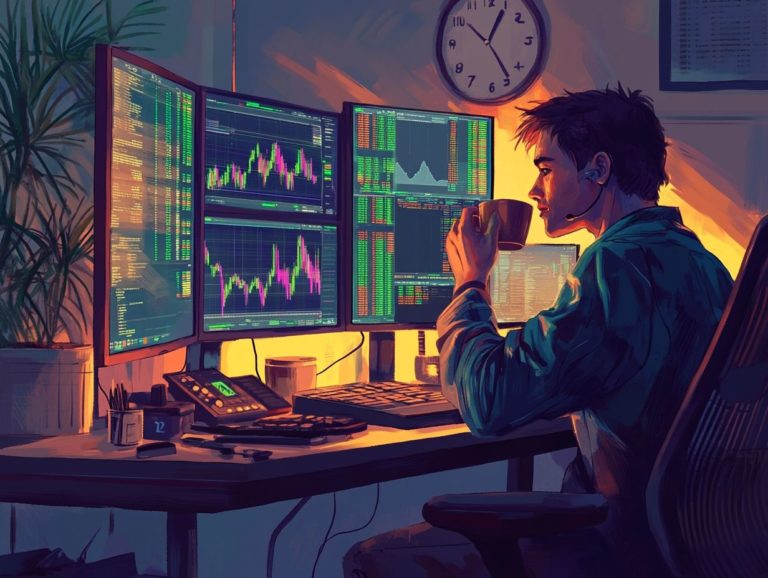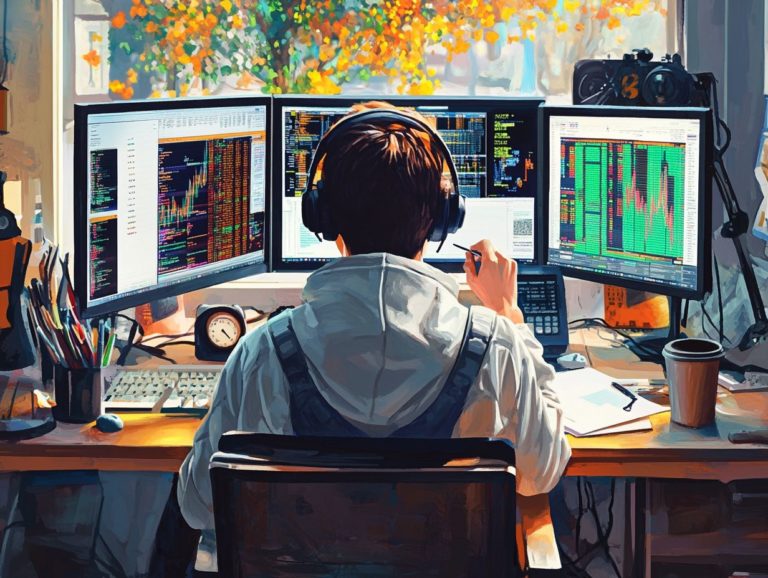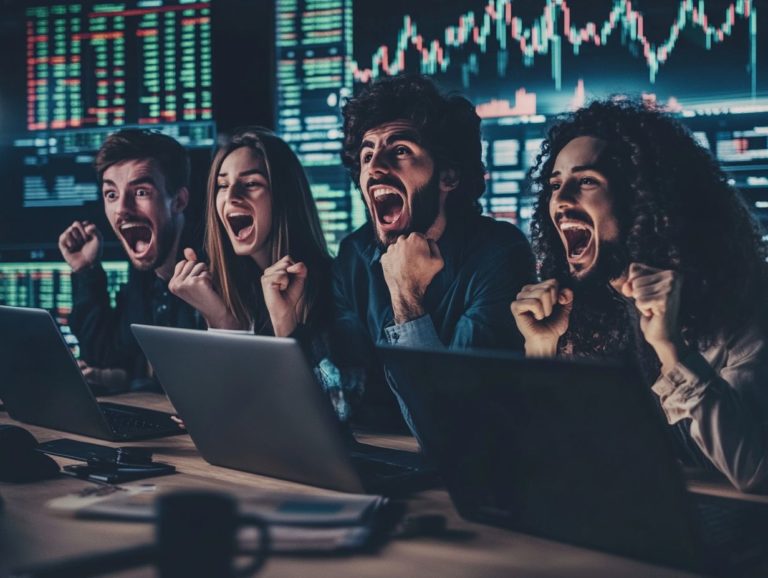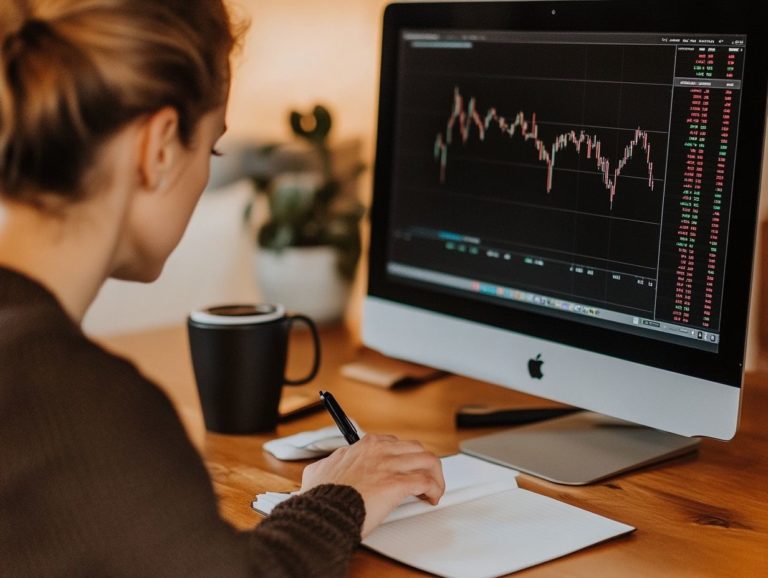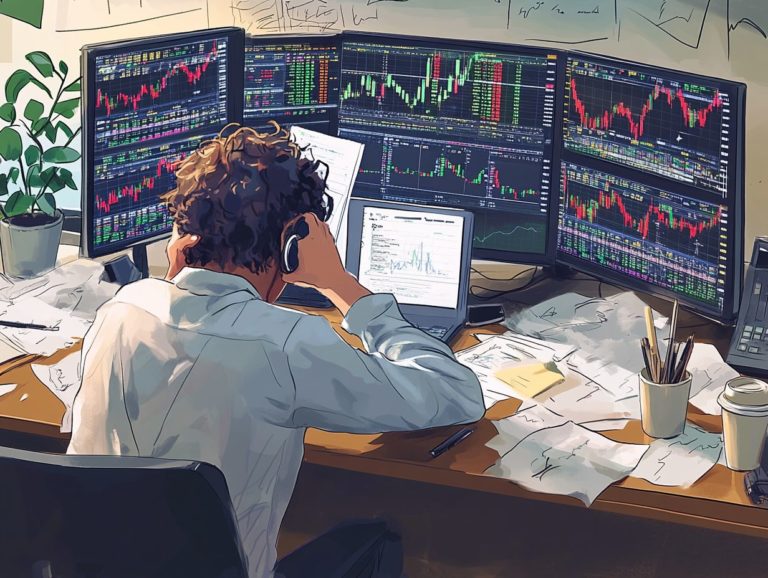The Influence of Social Media on Trading Psychology
In today’s fast-paced financial landscape, trading transcends mere numbers; it is profoundly influenced by psychology, particularly through the lens of social media.
Let’s explore the psychological factors at play in trading. This article illuminates how various platforms shape your mindset as a trader. You ll discover both the positive and negative impacts of social media how it can cultivate a supportive community while also triggering emotional biases like FOMO.
By grasping these dynamics, you can navigate the intricacies of trading with greater finesse and make more informed decisions. Join us as we unpack the intricate relationship between trading psychology and the influence of social media.
Contents
- Key Takeaways:
- Understanding Trading Psychology
- The Impact of Social Media on Trading
- Positive Effects of Social Media on Trading Psychology
- Negative Effects of Social Media on Trading Psychology
- Managing Social Media Influence on Trading Psychology
- Frequently Asked Questions
- How does social media influence trading psychology?
- Can social media affect an individual’s emotions when it comes to trading?
- Is there a positive aspect of social media on trading psychology?
- How can traders avoid negative influences of social media on their trading psychology?
- Can social media cause financial losses due to impulsive trading decisions?
- How can traders use social media to improve their trading psychology?
Key Takeaways:

- Recognize the profound impact social media has on your trading psychology.
- Set clear boundaries to filter out noise from social media.
- Build a supportive community to strengthen your trading plan.
Understanding Trading Psychology
Understanding trading psychology is vital for anyone aspiring to thrive in today s fast-paced financial markets. Emotional control and mental clarity significantly influence your investment decisions.
This is especially true if you re a day trader maneuvering through a landscape filled with challenges like information overload. Recognizing the psychological factors at play gives you the power to cultivate disciplined trading techniques that can enhance your immediate performance and pave the way for long-term success.
Overview of Psychological Factors in Trading
Psychological factors in trading play a crucial role in shaping how you make investment decisions and respond to market news. By understanding these influences, you can enhance your ability to interpret technical analysis and manage the emotional contagion the way emotions spread among traders that often surfaces during volatile market conditions.
For example, fear can make you hesitate or prompt rash decisions, leading you to sell at the first hint of a downturn. On the flip side, greed might tempt you to hold your positions longer than is wise, all in the hope of snagging a bit more profit.
Emotional contagion often emerges on trading floors or online platforms. This can lead to herd behavior that clouds your individual judgment. A striking instance of this occurred during major market movements, such as the initial shock of the COVID-19 pandemic, where panic selling drowned out rational analysis and triggered significant market shifts.
By recognizing these psychological influences, you can cultivate healthier mental habits and make more informed, calculated decisions that will serve you well in the trading arena.
The Impact of Social Media on Trading
The impact of social media on trading is unmistakable, particularly among Millennials and Gen Z investors who harness platforms like Reddit and YouTube for valuable market insights.
With the rise of channels such as Twitter and Instagram, the way you access information and make investment decisions has undergone a significant transformation. This shift has created a more democratized trading landscape, giving you the power to navigate the markets with greater confidence and knowledge.
How Social Media Affects Traders
Social media influences your trading journey by presenting both opportunities and challenges. Here, emotional control becomes a pivotal factor in your decision-making. The allure of immediate gratification can tempt you into impulsive trading behaviors, potentially undermining your long-term investment strategies.
You often find yourself inundated with real-time updates, market sentiment analyses, and the latest trends. All of this can cloud your judgment. Recent studies indicate that around 60% of traders feel pressured to act swiftly, frequently resulting in regrettable decisions made in the heat of the moment.
While social platforms undoubtedly offer valuable insights and the chance to connect with fellow investors, they can amplify anxiety during periods of market volatility. Research highlights the significance of emotional regulation. Those who adopt a disciplined approach paired with strategic planning generally outperform peers who fall prey to the rapid flow of information on these platforms.
The Role of Social Media in Market Trends
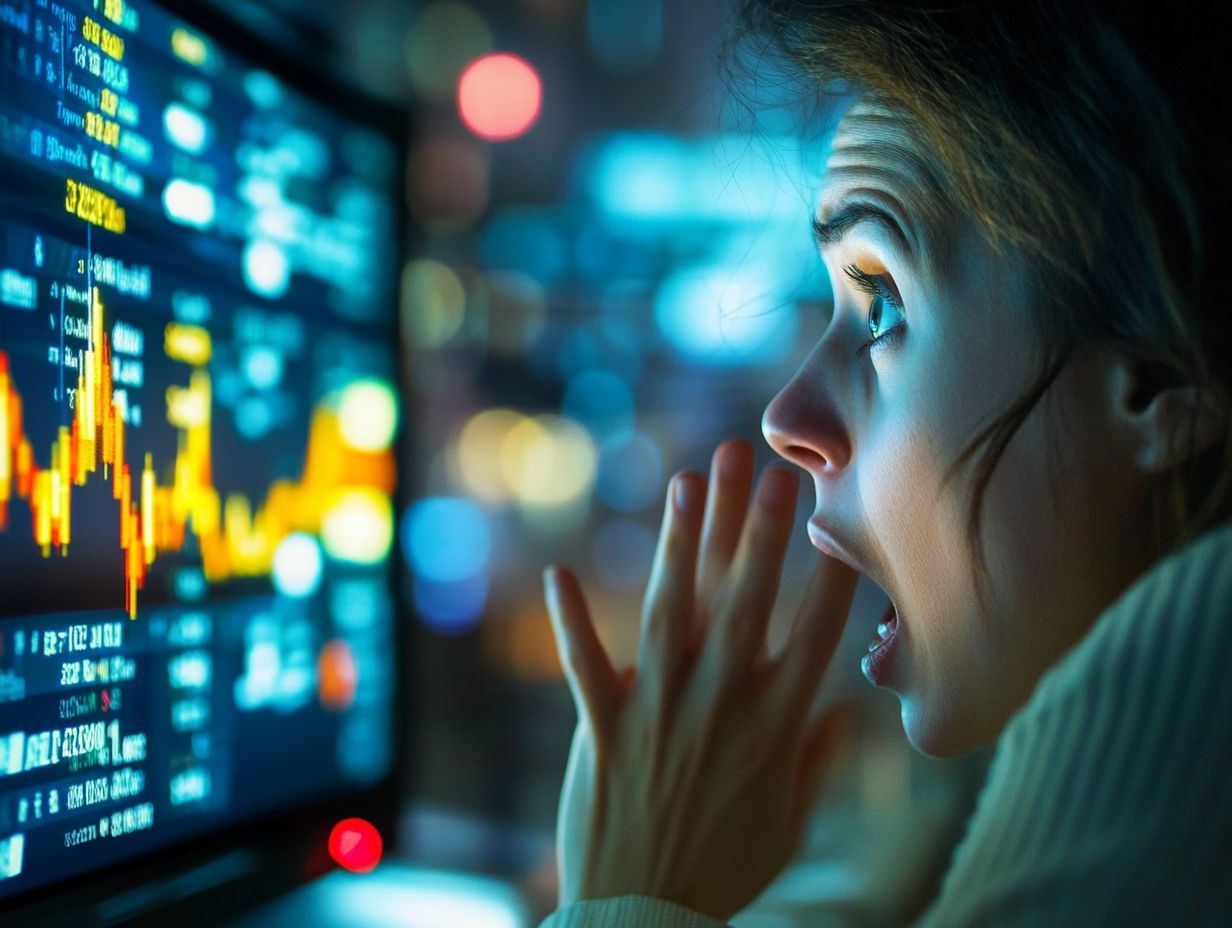
The role of social media in shaping market trends is undeniable; it often amplifies the fear of missing out (FOMO) and the phenomenon where one person’s emotions can influence others among traders. By understanding these dynamics, you can become more attuned to how social sentiment influences market movements.
Platforms such as Twitter and Reddit have evolved into modern-day town squares. Here, rumors and trends can spread like wildfire, triggering significant price fluctuations. The GameStop saga is a thrilling example of how a group of retail traders, energized by social media, can flip the script on traditional finance! Similarly, Tesla s stock has been known to react sharply to tweets from its CEO, causing widespread fluctuations in mere minutes.
These examples illustrate that social media transcends its role as a communication tool. It also functions as an echo chamber, amplifying hype that may lead you to either overreact or overlook critical information.
Positive Effects of Social Media on Trading Psychology
One of the notable benefits of social media on trading psychology is the enhanced access it provides to market insights. You can tap into a wealth of information and diverse perspectives, including understanding the psychological impact of trading frequencies, that can shape your investment strategies.
Social media helps you build supportive trading communities. This fosters an environment where traders can share experiences and advice. This sense of camaraderie not only gives you the power to make informed decisions but also offers the emotional support needed to navigate challenging market conditions.
Access to Information and Market Insights
Access to information and market insights has been transformed by social media. It gives you the edge needed to thrive in a competitive landscape. Platforms like Reddit and Twitter offer real-time updates and analyses that can significantly shape your trading decisions.
For instance, you might find yourself keeping a close eye on Twitter feeds from influential market analysts or financial institutions to capture breaking news or spot emerging trends. Imagine noticing a surge in a company’s stock price right after a popular analyst tweets about an upcoming product launch those moments can be game-changers.
Similarly, on Reddit s r/stocks, a vibrant community of traders shares insights and forecasts, allowing valuable information to circulate at lightning speed. These examples show how quick access to data can lead to trades that change the game for you, underscoring your growing reliance on social media as a critical tool in modern trading strategies.
Don’t miss out on the advantages social media can offer start connecting with fellow traders today!
Building a Supportive Community
Building a supportive community through social media can significantly enhance your emotional control as a trader, leading to more strategic investment decisions. Engaging with others in trading communities fosters a sense of belonging and shared knowledge.
This sense of community helps alleviate the psychological pressures that come with trading. Platforms like Discord, Reddit, and Facebook groups have become popular hubs for traders to exchange insights, share experiences, and offer encouragement.
These digital gathering spaces promote learning together, where less experienced traders can soak up valuable wisdom from seasoned professionals. They also provide emotional resilience through shared challenges and successes.
For example, joining a focused trading group on Reddit can spark discussions that help you refine your strategies while also offering moral support during market downturns. This synergy cultivates an environment where you feel empowered and informed, enhancing your overall trading journey.
Negative Effects of Social Media on Trading Psychology
While social media offers numerous advantages, it can also negatively impact your trading psychology. Understanding the psychology of trading strategies is crucial, as it has the potential to provoke emotional responses, which often leads to impulsive trading decisions.
The pervasive fear of missing out (FOMO) and the influence of emotional contagion can easily overwhelm you, distorting your judgment and complicating your investment strategies.
Emotional Triggers and Biases
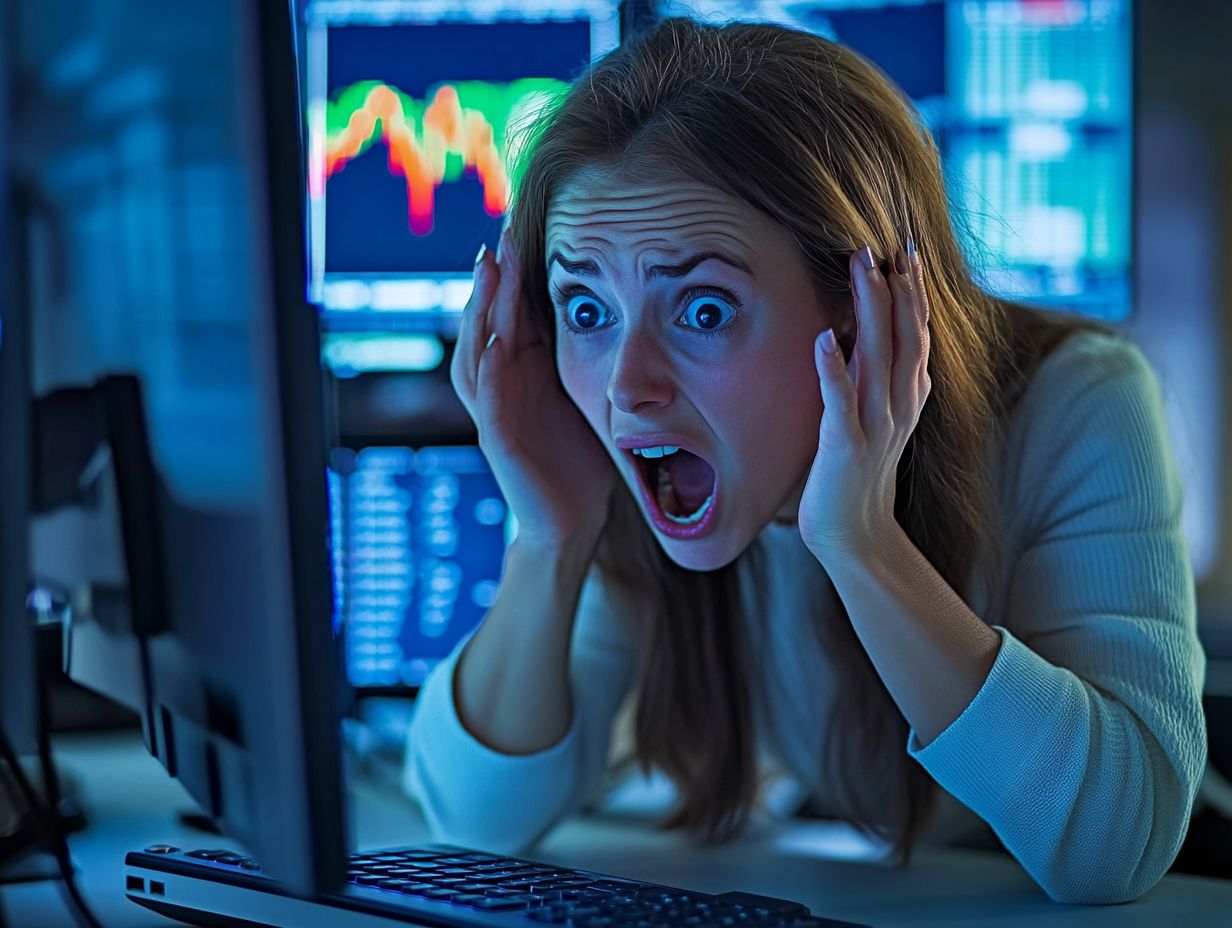
Emotional triggers and biases can significantly distort your trading psychology, leading to poor decision-making and impulsive trades. Being aware of these mental traps is essential for anyone looking to maintain a disciplined approach.
Recognizing how emotions like fear and greed influence your judgment is crucial, as they can cloud your perception and lead to hasty decisions. To counter these tendencies, you should develop a structured trading plan that includes clearly defined entry and exit points.
Practicing self-reflection, or taking time to think about your feelings and actions, during trades will help you identify emotional reactions that could derail your strategy. Incorporating techniques like mindfulness helps create a mental buffer, allowing you to make more rational decisions.
By prioritizing emotional regulation and fostering a supportive trading environment, you ll enhance your ability to navigate market fluctuations effectively, ultimately paving the way for greater trading success.
FOMO and Impulsive Trading
Don’t let FOMO control your trades! Instead, focus on mastering your emotions. FOMO (Fear of Missing Out) can lead to impulsive trading behaviors, derailing even the most disciplined traders.
In a world where social media amplifies this fear, exercising emotional control becomes essential to avoid hasty decisions. As you observe others potentially capitalizing on market movements, the anxiety of being left behind can quickly become overwhelming.
This pervasive mindset creates the perfect storm for poor decision-making, where you might find yourself buying into positions without sufficient analysis or exiting trades prematurely simply out of anxiety. To combat these impulses, establishing a solid trading plan is crucial.
This plan should include clear entry and exit strategies, as well as robust risk management techniques, which are methods to protect your investments from large losses. Practicing mindfulness and keeping your focus on long-term goals will help you maintain emotional stability, ensuring that your decisions are grounded in logic rather than fleeting emotions.
Managing Social Media Influence on Trading Psychology
Effectively managing the influence of social media on your trading psychology is essential for maintaining focus and discipline in your trading activities. You need to craft a robust trading plan and stick to it, all while filtering out the distracting or conflicting information that often floods social media channels.
Act now to filter out distractions and keep your eyes on the prize.
Setting Boundaries and Filtering Information
Setting boundaries and filtering information is crucial for you as a trader to protect your trading psychology from the overwhelming noise of social media. By carefully curating your information sources, you can concentrate on valuable insights while minimizing distractions and emotional triggers.
One effective strategy is to establish specific times for checking social media. This will help prevent constant interruptions throughout your trading day. Follow only those accounts that consistently deliver informative, unbiased content, steering clear of sensationalist posts that can cloud your judgment.
Consider using tools like RSS feeds or curated newsletters to streamline your intake of market news. This ensures that only the most relevant updates capture your attention. Joining focused online trading communities can also promote meaningful discussions while filtering out irrelevant chatter, ultimately enhancing the quality of information you consume.
Developing a Strong Trading Plan and Sticking to It
Developing a strong trading plan and adhering to it is crucial for maintaining discipline in your trading psychology. A robust trading plan outlines your strategies and reinforces emotional control, enabling you to resist impulsive urges amplified by social media.
An effective trading plan should encompass clear objectives, entry and exit strategies, and ways to protect your investments. By setting specific criteria for when to buy or sell, you can limit the influence of external pressures.
Incorporating regular reviews and adjustments ensures that your plan evolves with market conditions. Those who prioritize discipline discover that it minimizes emotional decision-making while fostering a sense of accountability. This structured approach gives you the power to navigate market fluctuations with confidence, significantly reducing susceptibility to distractions that often lurk in social media environments.
Frequently Asked Questions
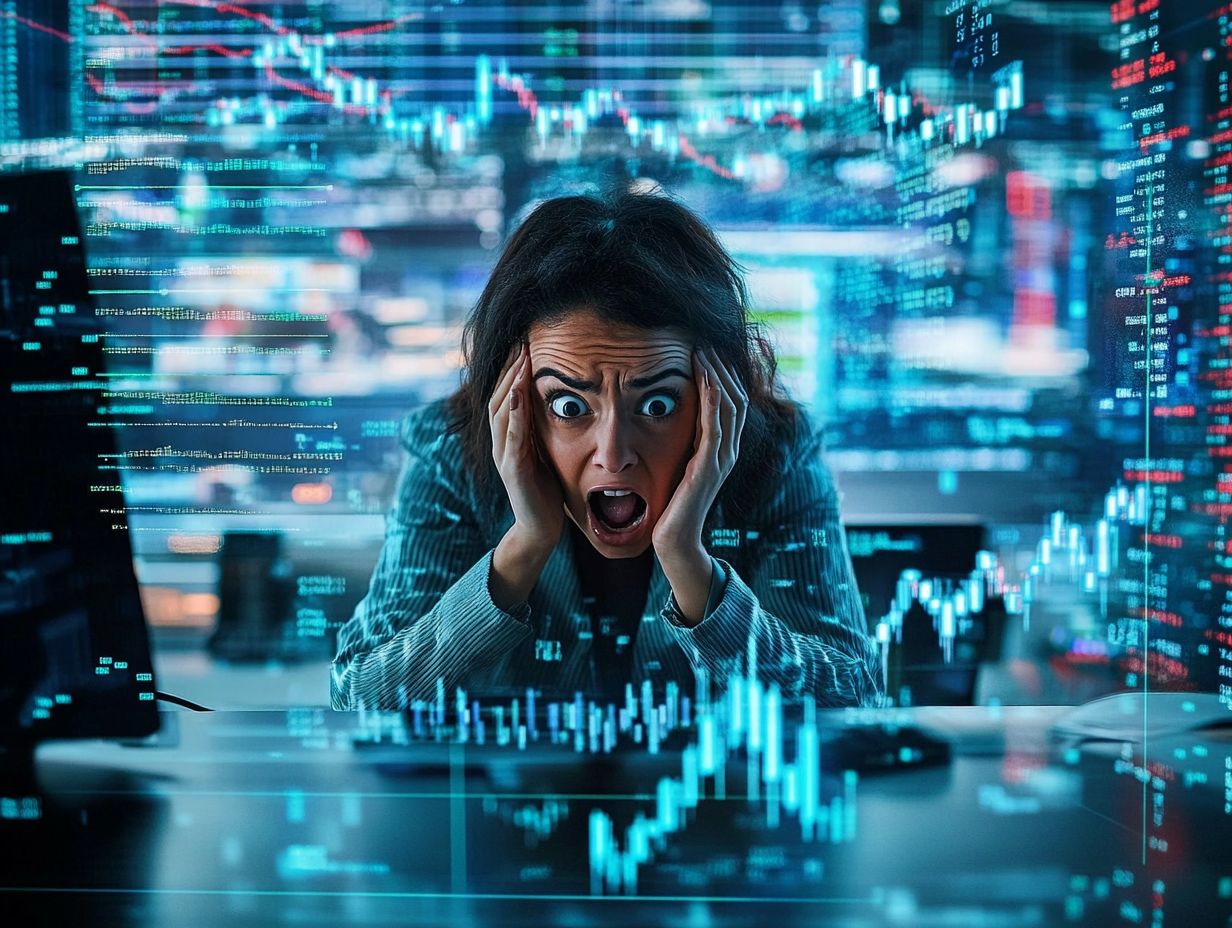
Social media can impact trading psychology by creating a fear of missing opportunities if investors see others making successful trades. For a deeper understanding, check out the science of trading psychology. Additionally, it can create a sense of competition and pressure to make quick decisions based on popular trends.
Absolutely! Social media often sparks emotions like excitement or fear, pushing traders to make snap decisions. It can also foster a false sense of security or overconfidence in one’s trading abilities.
Yes! Social media provides a platform for traders to connect and share knowledge, strategies, and analysis. It can serve as a source of inspiration and motivation for traders to improve their skills and stay updated on market trends.
Traders can limit their exposure to social media and follow only reputable sources for trading information. It is also important to have a solid trading plan and stick to it rather than being swayed by the opinions and actions of others on social media.
Yes! Social media can contribute to financial losses if traders make hasty decisions based on information or trends shared on social media platforms. Always conduct thorough research and analysis before making any trading decisions.
Traders can use social media as a tool to stay informed about market news and trends, connect with other traders for support and advice, and reflect on their past mistakes. Make sure to balance your time on social media to stay sharp and focused!
Start curating your social media today for a clearer trading mindset!

